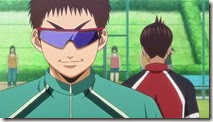 |
 |
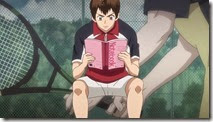 |
Those were master strokes, indeed.
I was a little surprised by how much negativity I saw from manga readers when this match arrived upon the scene in the Baby Steps anime. Not shocked mind you, as this is one of the more unusual scenarios that plays out in the series – but Baby Steps is a pretty unusual sports manga. It was actually during the Iwasa-kun match that I really decided that Baby Steps was exceptional – that this was an author who really understood the quirkiness of tennis and the people who play it, and was committed to telling an idiosyncratic story about ad idiosyncratic kid’s journey of learning tennis by learning about himself.
I’m not going to write a post exhaustively defending the Iwasa encounter, because people are obviously entitled to their own opinion. I’d just point out that it’s both consistent with the themes of Baby Steps and the reality of tennis. In the first place the notion of teaching people the game by getting them to visualize drawing on the court is quite legitimate – it just happens that for personal reasons Iwasa takes it to quite the extreme (happily he has superb taste in art). And a constant throughout Baby Steps is Ei-chan being forced to adapt to people who think differently than he does, and learning from them in the process.
One thing that’s important to understand about Iwasa-kun is that he’s not playing tennis primarily for the love of the game, or because he’s determined to be a pro or even the best junior in Kanagawa. He’s playing it a creative outlet – a way to express himself. It’s unusual, but not unheard of – especially for someone who’s frustrated by a lack of opportunities to vent his creative energy. It’s no coincidence that Iwasa has no idea who his opponent is – his opponent is only relevant in terms of how he impacts Iwasa’s expression. If the court is the canvas and Iwasa’s shots are the paint, then in a way the opponent is the brush – what kind of brush Iwasa is given guides his choice of what sort of work he wants to paint.
Now – could it be argued that Iwasa is using that as a sort of self-hypnosis – a way to psych himself up to doing what he has to do to succeed without openly admitting he cares about winning? I think so – but it’s also true that not every young athlete with talent has to prioritize their sport above everything else in their life. And I don’t think Iwasa does – he cares more about the art. But what Iwasa doesn’t realize is that for him, the art he’s practicing isn’t painting, but tennis – he can do things normal people can’t because of his unique temperament. Rather than using the tennis as a means to paint the picture, I think what Iwasa is doing is using the picture as a means to paint the tennis.
Naturally, as a stifled artist son of two artist parents, little Iwasa took to the notion of drawing lines with his shots like a duck to water. The rest, as they say, is history – and the result is an opponent who (again) confounds Maruo utterly. This is a huge part of the story of Maruo’s Baby Steps – this discovery that the world is full of people who think differently than he does. Tennis is that sort of sport – everyone chooses their own way to try and get from Point A to Point B. Maruo’s first instinct, always, is to try and break the code – to break down his opponent by understanding what he’s trying to do and responding. It’s Maruo’s essential nature as a tennis player, the counterattack – and very often it’s the best approach, though not always. And having been given a clue by the attendant in the tennis shop, he has an idea already of why Iwasa is using such an inexplicable shot pattern – but not what Iwasa’s ultimate intentions are.
The result is what happens when two very curious boys play tennis – a very curious match. Maruo sees Iwasa as the perfect opponent in a sense, once he’s figured out basically what Iwase is trying to do – because drawing his picture is more important than winning the point for Iwasa and because Maruo’s greatest strength is being a human backboard, all he has to do is return Iwasa’s shots until he’s finished what he’s set out to do and Iwasa will lose interest. And Iwasa sees Maruo as the perfect opponent because he gets enough shots back to allow Iwasa the strokes (double meaning) he needs to complete his picture, but isn’t so good that he forces Iwasa to abandon his painting in the middle. This approach leads to Maruo building a 5-2 lead in a match full of marathon rallies, though Iwasa seems roundly unruffled by that development. In fact, he’s thrilled because Ei-chan’s uniquely all-arounder style has allowed Iwasa to actually try Impressionism (Monet’s “Water Lilies”) – impossible against a weaker opponent.
In truth, Iwasa isn’t going to just let the match end – Ei-chan both senses this and realizes intellectually that Iwasa could never have risen to the level of a third seed if he were that easy a mark? Is Iwasa really fighting back because he’s not done painting – or does he just not want to lose the match and doesn’t want to admit that to himself? In any event, now that his buffer zone is gone Iwasa profoundly amps up his game, which in turn forces Ei-chan to go back to the intellectual well and figure out what to do when an opponent with more weapons in his arsenal renders his purely reactive and defensive style inadequate. This sort of chess game is the heart of soul of the matches in Baby Steps – the hard work to level up physically happens between matches, but once the umpire says “Play” it’s with his mind that Ei-chan must find a way to get to the next level. That’s tennis – and that’s Ei-chan. And interesting opponents like Iwasa that force him to expand his mind are the brush with which he paints his tennis.
 |
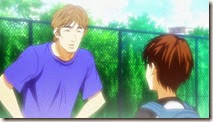 |
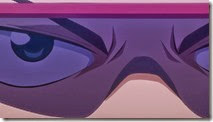 |
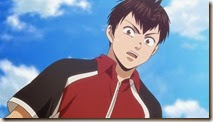 |
 |
 |
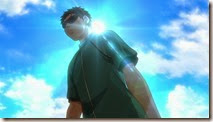 |
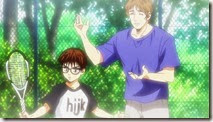 |
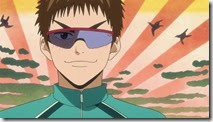 |
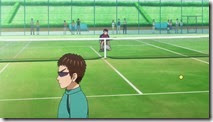 |
 |
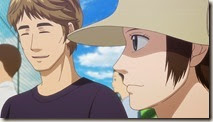 |
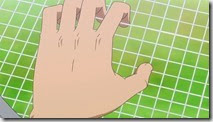 |
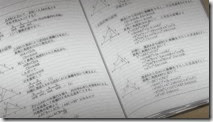 |
 |
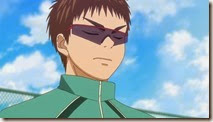 |
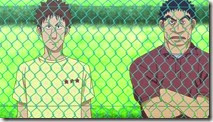 |
 |
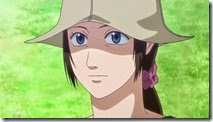 |
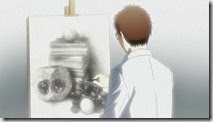 |
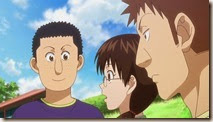 |
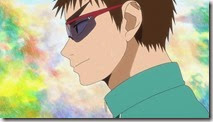 |
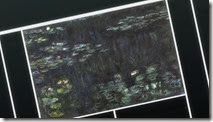 |
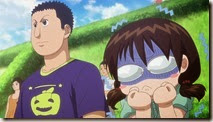 |


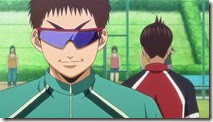
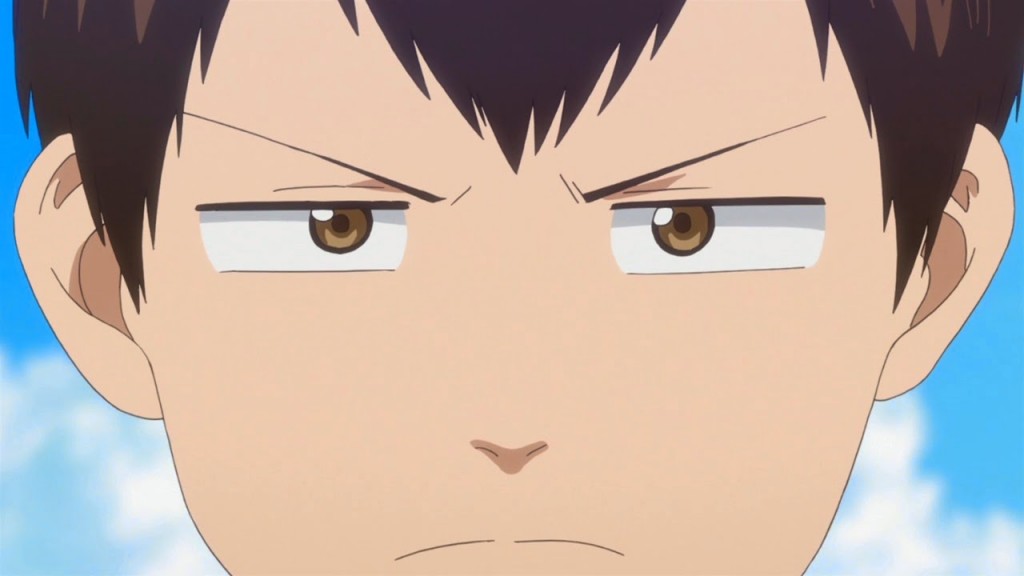
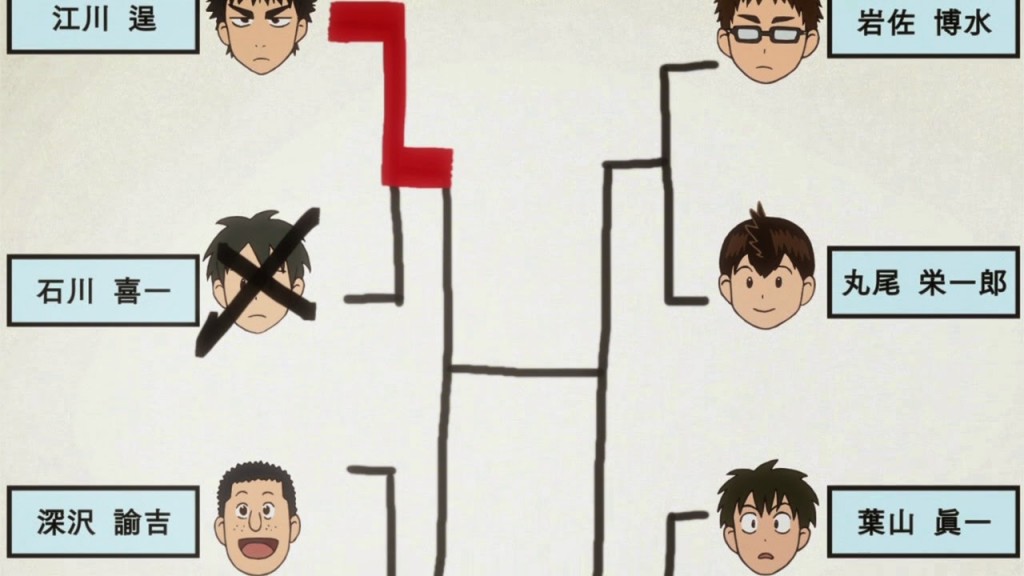
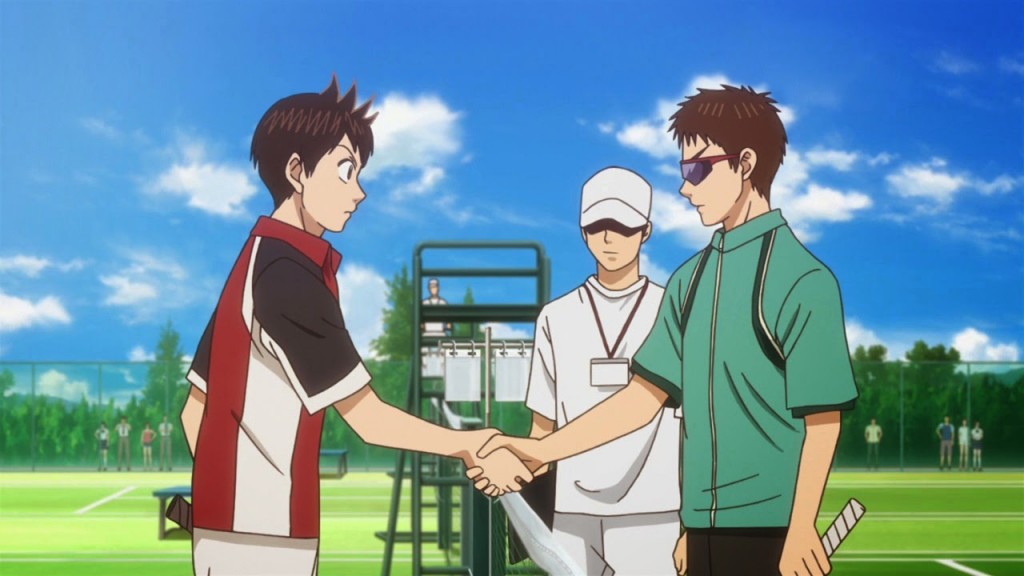
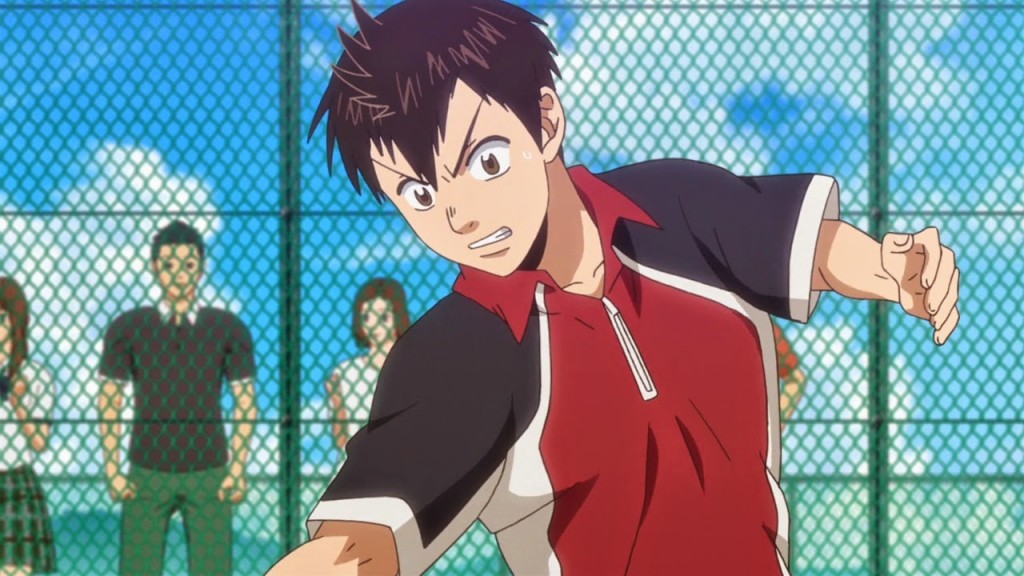
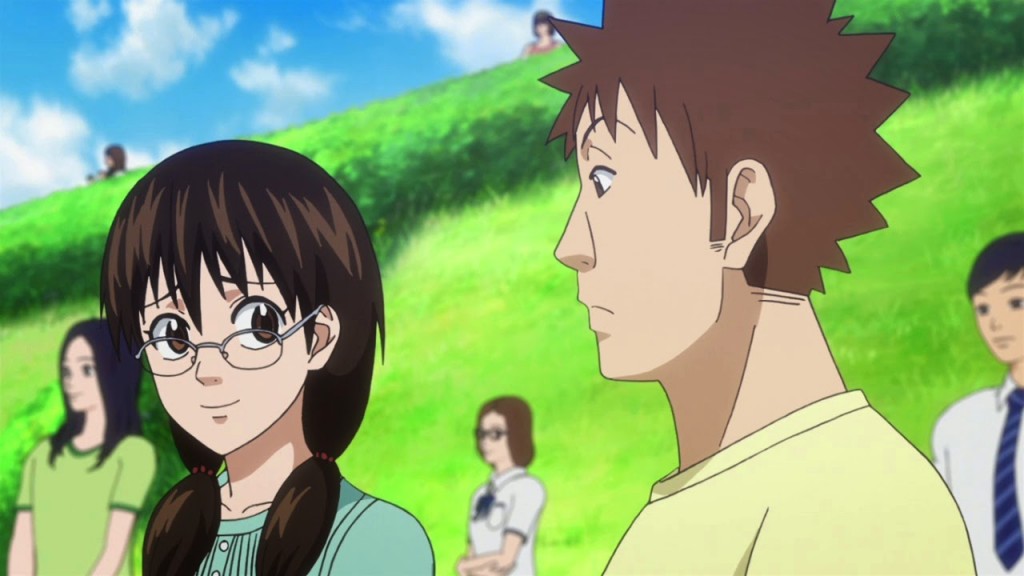
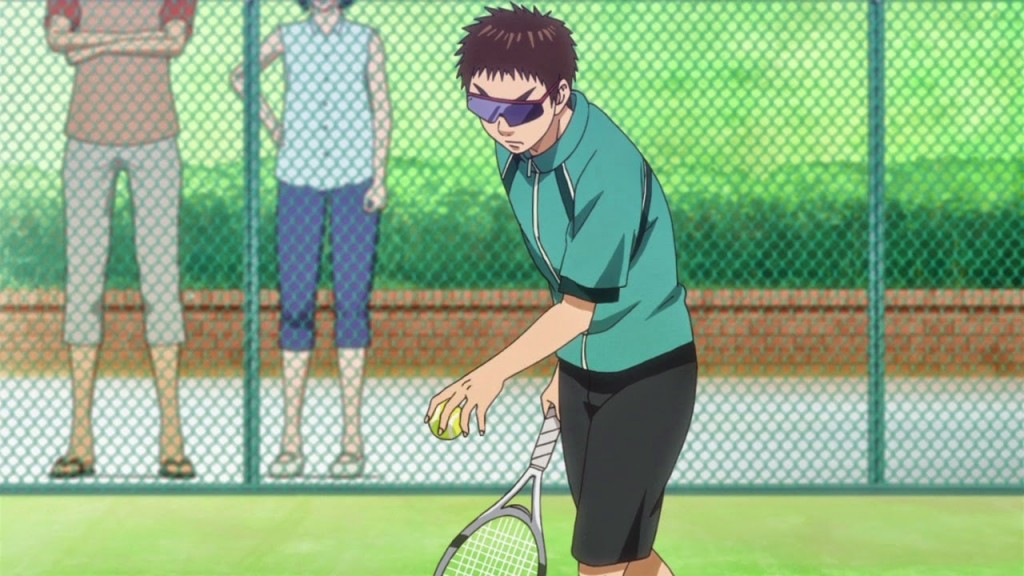
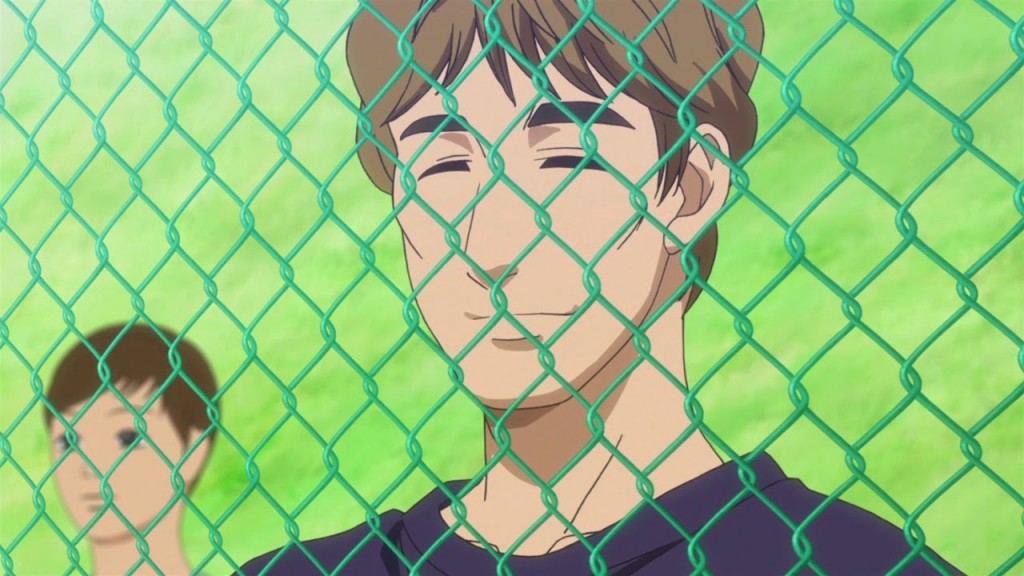
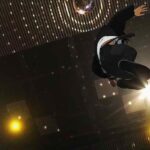

maverickmann84
June 30, 2014 at 4:25 amI'll admit that when I first read this match in the manga, that it did come off as a little strange and potentially unbelievable. Not necessarily about the drawing lines part, but that he seemingly could do so with such ease. Though, to me, it doesn't come off as something JUMPish at all, just maybe a bit over the top. And when you take into consideration what this match, and Iwase, means to Ei-chan's development it's hard to find anything wrong with it. He's just another quirky tennis player, one who has a pretty big impact on Ei-chan.
Like you said the last few weeks, this really is the time where each opponent Ei-chan faces become such important character to his development as a person and a tennis player. Even if you don't like how he plays tennis or find it unbelievable, you can't deny that his story and his match with Ei-chan is crucial in Ei-chan's development and very entertaining because of that.
Linuss
June 30, 2014 at 7:34 amThis episode is as outlandish as it comes for Baby Steps, bordering on matching a typical prince of tennis episode. I didn't exactly hate it, but I was not a fan either.
Nadavu
June 30, 2014 at 7:14 pma bit strange, but not as bad as talking to one's pecks.